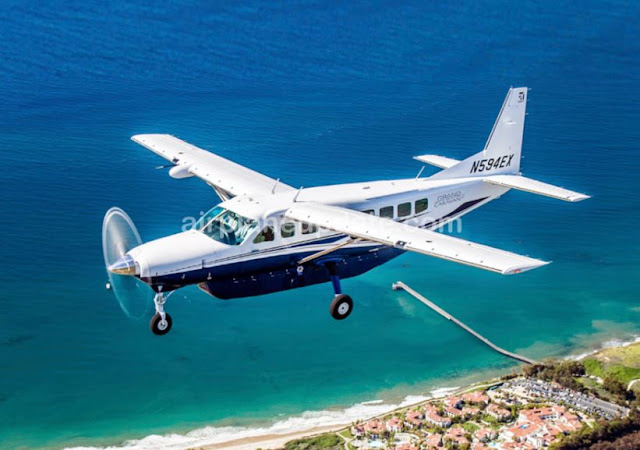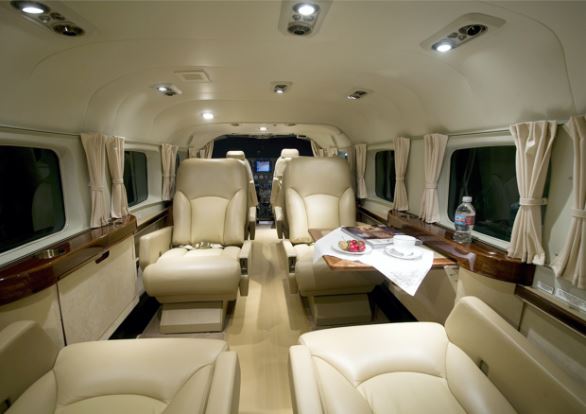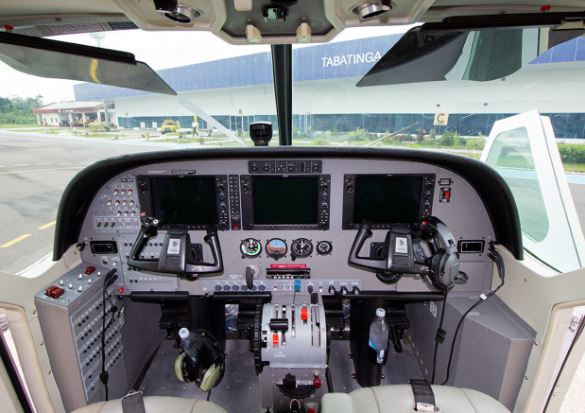Cessna Caravan Specs, Cockpit, Interior, and Price – Cessna Caravan is a single lightweight turboprop utility and passenger aircraft manufactured by the Cessna Aircraft Company in Wichita, Kansas. The aircraft operates in 70 countries around the world and is known for its ability to use rough terrain and runways, economic operations and versatility for high speed and heavy loads.
The aircraft, with sturdy high wings and pointed wings and tail, has been chosen for use by several governments and also for cargo, air passengers, military and paramilitary roles, for patrol, surveillance and rescue.
More than 1,500 Caravans have been shipped since the Caravan 208A began operating in 1985. 208B Super Cargomaster entered service with Federal Express in 1986 and was upgraded with the new Pratt & Whitney PT6A-114A engine in 1991. The current production version is the Caravan 625 ( Basic Caravan with multi-level engine), Grand Caravan (14-passenger version of 208B stretched), Super Cargomaster and Amphibious Caravan.

The elongated version, 208G, includes additional airframe parts or plugs to the rear of the wing which provide an additional cabin length of 1.22 m. The stretched version can carry a load of 1,587kg. Federal Express uses two parts above and below the cargo door, which can be removed, repaired open or opened in flight for decreasing air cargo.
Military variants carry the designation of the US U-27A and are used as troop carriers and air cargo as well as for VIP transportation, air ambulance and medical evacuation, front air control, infiltration and exfiltration of troops, and as a command center for unmanned forces. aerial vehicle operations.
U-27A is used by the US Central Intelligence Agency and the US State Department. Caravan 208 also operates with the Brazilian Air Force and Colombia and the Chilean Army.
LICA low-intensity conflict aircraft are equipped with General Dynamics reconnaissance pods at the bottom of the GECAL Gatling fuselage and gun, 0.50 caliber, at the door. The aircraft can also be equipped with a system for the role of electronic warfare.
The aircraft's de-icing system includes electric propeller boots, electrically heated windshields, heated pitot tubes, an ice detection system and a backup electrical system. Ice protection TKS from Aerospace Systems & Technology is available in the Caravan with cargo pods starting in July 2009.

The 9.6 m³ cabin is 4.57 m long and 1.57 m wide. The cabin is equipped with a flat floor to facilitate cargo maneuvering and can accommodate two standard D-size cargo containers or ten 208l drums. The floor is equipped with cargo tracking attachments.

The Honeywell Silver Crown avionics suite can include a Kings 250 radio flight control system, with KWX 56-color weather radar, KLN 94 global positioning system with a full color moving map display, KMD 850 and autopilot KFC 225 digital display with altitude selection commands.
Garmin navigation communication and global positioning system, GNS 340, consists of the GNS 530 wide area active surveillance radar, IFR communication (instrument flight rules), global navigation and positioning systems with glidescope communication channels and receivers, and GTX 327 digital transponders for Mode C.
In September 2007, Cessna announced that all new Caravan models would be equipped with a glass cockpit consisting of the Garmin G1000 integrated avionics system.
These include an integrated dual-channel GFC700 digital autopilot flight control system, three 10in screens (two main flight screens and one multifunction screen), aviation director, traveling mode, wide-area augmentation system (WAAS) and SafeTaxi, aircraft representation graphs at the airport environment . Optional features include TAWS-B, XM radio and XM weather.
The Caravan equipped with the Garmin G1000 received the Federal Aviation Administration (FAA) certification and began shipping in April 2008. The European Aviation Safety Agency (EASA) certification was followed in July 2008.
Air St Kitts-Nevis received the Grand Caravan in September 2010. The company also ordered another Grand Caravan in 2010. Two Large Caravans were sent to AirGEO Russia in December 2010. As of May 2011, Cessna received orders for three unknown Caravans based in Italy.
The aircraft, with sturdy high wings and pointed wings and tail, has been chosen for use by several governments and also for cargo, air passengers, military and paramilitary roles, for patrol, surveillance and rescue.
More than 1,500 Caravans have been shipped since the Caravan 208A began operating in 1985. 208B Super Cargomaster entered service with Federal Express in 1986 and was upgraded with the new Pratt & Whitney PT6A-114A engine in 1991. The current production version is the Caravan 625 ( Basic Caravan with multi-level engine), Grand Caravan (14-passenger version of 208B stretched), Super Cargomaster and Amphibious Caravan.

Cessna Caravan Variants
Cessna Caravan Super Cargomaster
Federal Express operates a fleet of 39 208A Cargomasters and 260 208B Super Cargomasters. Cargomaster is an all-cargo variant without side windows and large cargo doors. The aircraft is equipped with additional cargo binding points, cargo nets and cargo load baskets under the aircraft.The elongated version, 208G, includes additional airframe parts or plugs to the rear of the wing which provide an additional cabin length of 1.22 m. The stretched version can carry a load of 1,587kg. Federal Express uses two parts above and below the cargo door, which can be removed, repaired open or opened in flight for decreasing air cargo.
Cessna 208 Caravan Amphibian
Landing wheels can be equipped with floating amphibians, Wipline 8000 type, or ski landing gear. The Royal Canadian Mounted Police operates Amphibians 208 Caravan.Military variants carry the designation of the US U-27A and are used as troop carriers and air cargo as well as for VIP transportation, air ambulance and medical evacuation, front air control, infiltration and exfiltration of troops, and as a command center for unmanned forces. aerial vehicle operations.
U-27A is used by the US Central Intelligence Agency and the US State Department. Caravan 208 also operates with the Brazilian Air Force and Colombia and the Chilean Army.
LICA low-intensity conflict aircraft are equipped with General Dynamics reconnaissance pods at the bottom of the GECAL Gatling fuselage and gun, 0.50 caliber, at the door. The aircraft can also be equipped with a system for the role of electronic warfare.
Cessna Caravan Engine
The Cessna Caravan is powered by the Pratt & Whitney Canada PT6A-114A turboprop which developed 503kW. The engine drives a reversible pitch of three bladed speed and a feather propeller. The wing fuel tank has 1.257l of fuel that can be used. The cruising speed at 3,000 m is 340 km / hr. The maximum range for flights is 3,050m with a 45-minute reserve of 1,780 km.The aircraft's de-icing system includes electric propeller boots, electrically heated windshields, heated pitot tubes, an ice detection system and a backup electrical system. Ice protection TKS from Aerospace Systems & Technology is available in the Caravan with cargo pods starting in July 2009.

Cessna Caravan Cabin and Interior
The cabin can be configured to carry nine passengers or up to 14 passengers with the neglect of the FAR Pt 23. The cab is heated and ventilated and optionally can be equipped with air conditioning.The 9.6 m³ cabin is 4.57 m long and 1.57 m wide. The cabin is equipped with a flat floor to facilitate cargo maneuvering and can accommodate two standard D-size cargo containers or ten 208l drums. The floor is equipped with cargo tracking attachments.

Cessna Caravan Cockpit and Avionics
The Cessna Caravan cockpit is equipped with a set of co-pilot instrumentation. The avionics suite is based on a choice of operators from Honeywell or Garmin avionics.The Honeywell Silver Crown avionics suite can include a Kings 250 radio flight control system, with KWX 56-color weather radar, KLN 94 global positioning system with a full color moving map display, KMD 850 and autopilot KFC 225 digital display with altitude selection commands.
Garmin navigation communication and global positioning system, GNS 340, consists of the GNS 530 wide area active surveillance radar, IFR communication (instrument flight rules), global navigation and positioning systems with glidescope communication channels and receivers, and GTX 327 digital transponders for Mode C.
In September 2007, Cessna announced that all new Caravan models would be equipped with a glass cockpit consisting of the Garmin G1000 integrated avionics system.
These include an integrated dual-channel GFC700 digital autopilot flight control system, three 10in screens (two main flight screens and one multifunction screen), aviation director, traveling mode, wide-area augmentation system (WAAS) and SafeTaxi, aircraft representation graphs at the airport environment . Optional features include TAWS-B, XM radio and XM weather.
The Caravan equipped with the Garmin G1000 received the Federal Aviation Administration (FAA) certification and began shipping in April 2008. The European Aviation Safety Agency (EASA) certification was followed in July 2008.
Cessna Caravan Price and Orders
The price of the latest Cessna Caravan is US $ 2.05 Million and Grand Caravan EX is US $ 2,575 Million in 2018. In February 2010, the Cessna sent five Grand Caravans to Susi Air as part of the order it ordered for 30 Grand Caravans in June 2009. It is expected to send a total of 11 in 2010 and the remainder by the end of 2011.Air St Kitts-Nevis received the Grand Caravan in September 2010. The company also ordered another Grand Caravan in 2010. Two Large Caravans were sent to AirGEO Russia in December 2010. As of May 2011, Cessna received orders for three unknown Caravans based in Italy.








No comments:
Post a Comment